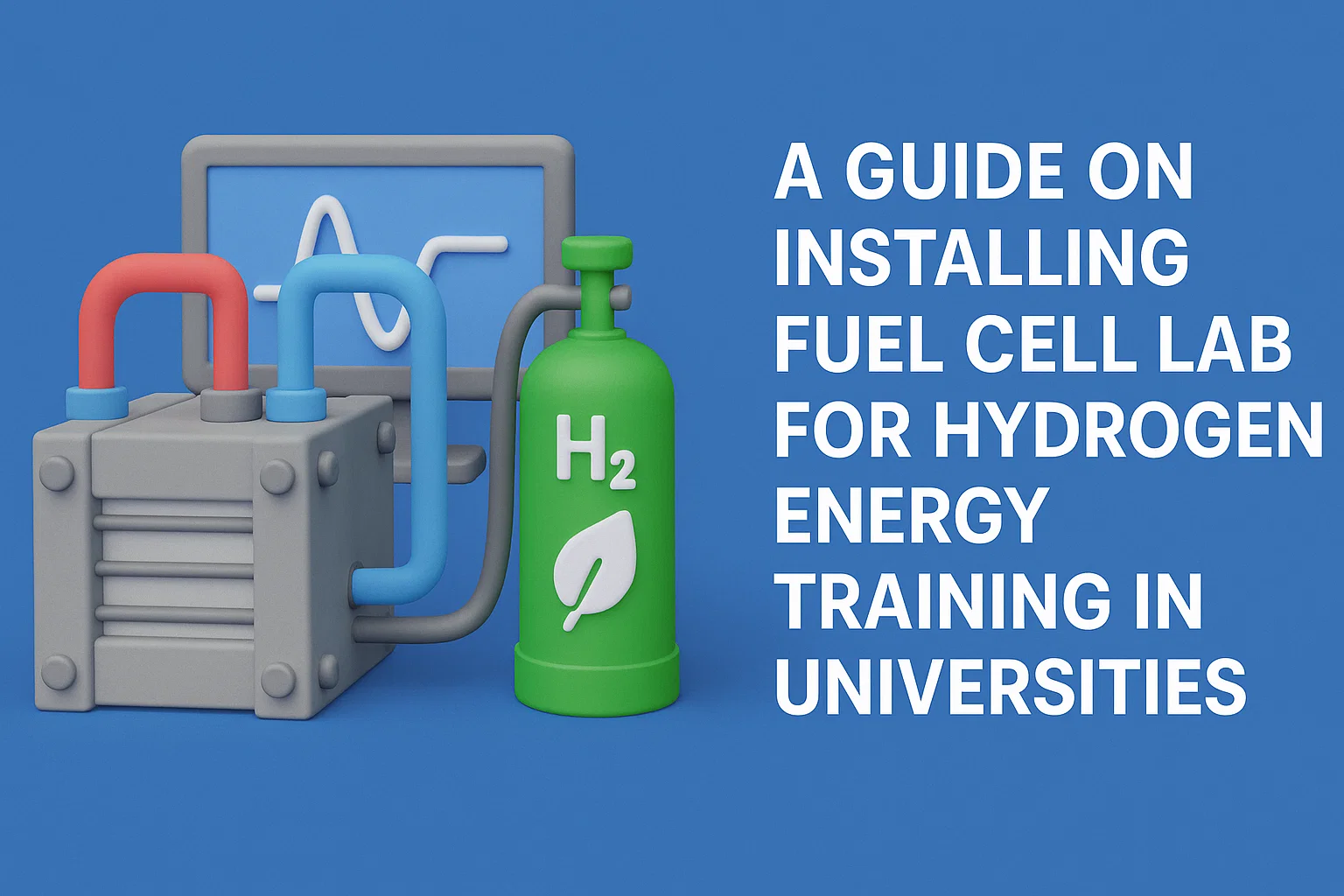Green Hydrogen is the only recognized net zero fuel in the world, offering zero emission alternative to the conventional fuels. As the world is transitioning towards net zero universities are increasingly incorporating hydrogen energy education into their programs.
Apart from industrial usage hydrogen also finds usage in transportation and stationary power generation through Fuel Cells. A dedicated Fuel Cell Lab provides students opportunity to understand the underlying principles, controlled operation, and handling. These labs go beyond traditional textbook learning and offer real-world insights about chemical energy to electrical energy transition.
Why Universities need a Fuel Cell Lab
Universities prepare workforce of the future. Theoretical knowledge alone cannot prepare students for the complexities of hydrogen energy systems. Fuel cells involve electrochemical reactions, power management, and system integration—skills best developed through experimentation.
A Fuel Cell laboratory enables learners to explore the handling, performance, efficiency, and a variety of safety aspects of different types of fuel cells such as PEM (Proton Exchange Membrane) and Alkaline Fuel Cells.
Here is a comprehensive list of what students can learn and explore in a fuel cell lab:
- Fundamentals of Fuel Cell Technology: Understanding the working principles. Learning about electrochemical reactions. Exploring sub components such as anode, cathode, catalyst, MEA (Membrane Electrode Assembly), GDL (Gas Diffusion Layers) etc.
- Fuel Cell System Design and Integration: Designing small-scale fuel cell stacks and testing performance characteristics. Integrating fuel cells with DC–DC converters, inverters, and load management systems. Exploring hybrid configurations, such as fuel cell–battery or fuel cell–supercapacitor systems.
- Performance Testing and Characterization: Measuring voltage-current (V-I) curves, power output, and efficiency under different loads. Understanding factors that affect fuel cell degradation, such as temperature, humidity, and gas purity. Conducting polarization curve and impedance analysis for diagnostic learning.
- Applications of Fuel Cell Technology: Studying real world applications like FCEV and stationary power generation.
- Safety and standards in handling hydrogen-based systems: Learning the safety codes and guidelines for working with hydrogen and high-pressure systems. Performing leak detection, ventilation design, and emergency handling procedures.
Steps to setup a Fuel Cell Lab
Setting up a fuel cell lab involves several steps:
- Identifying Learning Objectives: Determine whether the lab will focus on basic fuel cell operation for power generation and system integration, fuel cell electric vehicle, or advance research such as fuel cell modelling, characterization, and testing. This guides Fuel Cell Lab equipment selection and layout.
- Design Lab Layout: Ensure proper ventilation, safe gas purge lines pointing towards the roof, and ergonomic placement of instruments and fuel cell stacks. Hydrogen handling areas must follow strict safety standards.
- Implement Safety Protocols: Install gas detectors, emergency shut-off valves, fire suppression systems, and provide personal protective equipment. Regular safety drills should be conducted. Placement of gas detectors should be near every joint ensuring complete safety. For advanced safety ultrasonic gas detectors and flame detectors should also be added.
- Integrate Data Acquisition Systems: Provide sensors and software that allow students to monitor voltage, current, temperature, and efficiency in real time.
- Train Staff and Students: Educators and lab assistants should be familiar with hydrogen handling, fuel cell principles, and safety procedures to ensure effective training.
Following these steps helps universities establish a secure, functional, and versatile fuel cell lab.
Educational Benefits of a Fuel Cell Laboratory
A well-equipped fuel cell laboratory offers multiple educational advantages.
- Hands-On Learning: Students engage directly with hydrogen fuel cells, exploring real-world challenges and solutions.
- Research Opportunities: Labs support projects on efficiency optimization, hydrogen storage, and renewable energy integration.
- Skill Development: Learners acquire competencies in electrochemical systems, instrumentation, and safety management.
- Interdisciplinary Exposure: Fuel cell labs integrate chemistry, electrical engineering, mechanical systems, and energy studies.
- Industry Preparedness: Graduates gain experience relevant to hydrogen energy startups, automotive fuel cell R&D, and clean energy initiatives.
Through these experiences, students gain both theoretical knowledge and practical problem-solving skills crucial for the growing hydrogen economy.
Safety Considerations
Hydrogen is highly flammable and the flames are undetectable to human eyes making safety a critical aspect of any fuel cell lab. Proper ventilation, leak detection, fire suppression, and training protocols are essential.
In addition to that a triple layer safety system ensures safe operation. The triple layer safety system should incorporate Catalytic Hydrogen Gas Detector (detects hydrogen concentration), Ultrasonic detectors (detects sound) and Flame Detection (detects hydrogen borne flames).
Following these measures ensures the lab operates safely while allowing students to explore hydrogen energy concepts confidently.
Conclusion
As hydrogen energy becomes a central part of the global clean energy transition, universities play a key role in training the next generation of engineers. A fuel cell lab is an indispensable tool in this mission.
By providing hands-on experience with hydrogen fuel cells, storage systems, and energy conversion technologies, these labs bridge theory and practice. They foster research, innovation, and safety awareness, preparing students for careers in sustainable energy.
Universities considering advanced training infrastructure can explore solutions like a modular fuel cell laboratory to integrate practical hydrogen energy learning seamlessly into their programs. Such initiatives not only enhance academic quality but also contribute to the broader goal of a cleaner, hydrogen-powered future.






